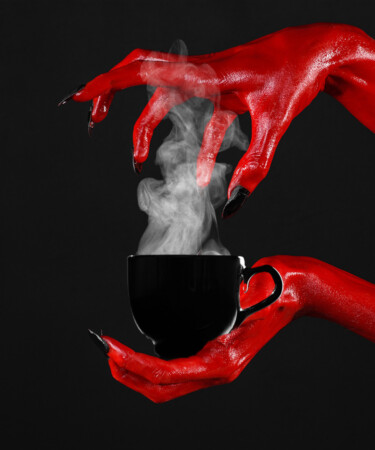Every day, over 2.25 billion cups of joe are consumed around the world. Americans alone consume over 517 million, and with such global omnipresence, it’s hard to imagine a time when coffee was not glittering in the glow of public favor. But alongside the drink’s reputation as a beloved beverage is an equally long history of those in power seeking to ban it, with 17th-century Venetians going as far as to call it the “bitter invention of Satan.”
Now grown around the world, coffee can be traced back to the Ethiopian plateau where it’s said to have been discovered by a herder who noticed a goat’s erratic behavior after it ate berries from a certain bush. After passing the information on to the local monastery, the abbots made a drink from the berries, finding that it helped them to stay alert during prayer, and the word of coffee eventually spread to the Arabian Peninsula and on to the Ottoman Empire.
There, those in political positions almost immediately viewed coffee as a challenge to their power: Whereas beer made people drunk (and thus somewhat incompetent), coffee had the potential to make its consumers sharp and alert. Many leaders made it their mission to outlaw coffee, believing it would give the people power to revolutionize, especially since it was mostly enjoyed in coffee houses that were referred to as “schools of the wise” where patrons expanded their minds with music, performances, and conversation. Sultan Murad IV of the Ottoman Empire, who ruled from 1623 to 1640, went so far as to make it illegal to purchase or consume the beverage, doling out beheadings as punishments to those found in violation.
When coffee arrived in Europe in the early 1600s via Venetian trade routes, it was embraced by the public, yet equally shunned by political and religious authorities. The Italian Catholic Church is said to have been particularly threatened by the beverage and even referred to the drink as the “bitter invention of Satan.” The local clergy urged Pope Clement VIII to condemn and outlaw the drink, but before the pope would make any decisions, he insisted on trying it for himself. The story goes that Pope Clement VIII then sampled a cup of coffee and deemed “Satan’s drink” to be “delicious.”
The pope then “blessed” the beverage, and 30 years later, coffee houses had sprung up across major cities in Italy and beyond, including Austria, France, Germany, and England. Churches had even started incorporating a “coffee hour” either before or after service, which allowed for parishioners to socialize — and enjoy the very beverage that would have been deemed Satanic just a few decades prior.
